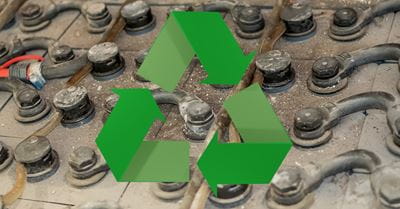Battery Recycling 101: Sustainable Practices for Forklift Battery Disposal

Forklift battery disposal requires sustainable practices to prevent environmental and safety risks. From certified recycling partnerships to safe handling procedures, responsible disposal ensures compliance, minimizes hazards, and supports corporate sustainability goals.
In today's industrial landscape, forklifts are the workhorses that keep operations moving smoothly. However, as essential as these machines are, their batteries—especially when they reach the end of their lifecycle—pose significant environmental and safety challenges. Proper disposal isn't just a regulatory requirement; it's a commitment to sustainability and corporate responsibility. Forklifts primarily utilize two types of batteries: lead-acid and lithium-ion. Lead-Acid Batteries: These have been the industry standard for decades. Comprising lead plates submerged in sulfuric acid, they are both heavy and potentially hazardous if mishandled. Improper disposal can lead to soil and water contamination due to lead and acid leakage. Lithium-Ion Batteries: Gaining popularity for their efficiency and longer lifespan, lithium-ion batteries contain materials like cobalt, nickel, and lithium. While more energy-dense, they can be volatile if damaged, posing fire risks. Environmental concerns arise from the mining and disposal of these metals. Discarding forklift batteries irresponsibly can have dire consequences: Environmental Hazards: Toxic substances can leach into ecosystems, harming wildlife and contaminating water sources. Legal Repercussions: Many regions enforce strict regulations on battery disposal. Non-compliance can result in hefty fines and legal action. Safety Risks: Improperly stored or discarded batteries can cause fires or expose workers to hazardous materials. To mitigate these risks, consider the following sustainable practices: Engage with facilities that specialize in industrial battery recycling. These centers are equipped to handle hazardous materials safely and ensure that valuable components are reclaimed. For instance, lead from lead-acid batteries can be recycled into new products, and sulfuric acid can be neutralized and repurposed. Before transporting batteries for recycling: Seal Battery Caps: Ensure caps are tightly sealed to prevent acid leaks during transit. Use Appropriate Personal Protective Equipment (PPE): Always wear gloves, goggles, and protective clothing when handling used batteries. Prevent Terminal Short-Circuiting: Separate battery terminals using non-conductive materials like wood or cardboard to prevent sparking. Secure Batteries During Transport: Firmly secure batteries to prevent movement and potential damage. 3. Stay Informed on Regulatory Guidelines Regulations surrounding battery disposal can vary by region. The Environmental Protection Agency (EPA) provides guidelines to ensure that battery collection and recycling are environmentally sound and safe for workers. Familiarize yourself with local laws to ensure compliance and adopt best practices. Regular training sessions can empower your team to handle batteries safely. Knowledgeable employees are less likely to make mistakes that could lead to environmental contamination or personal injury. Some manufacturers offer take-back programs, accepting used batteries for recycling. This can simplify the disposal process and ensure that batteries are handled responsibly. By adopting these practices, businesses not only comply with regulations but also contribute to a more sustainable future. Proper forklift battery disposal minimizes environmental impact, enhances workplace safety, and underscores a commitment to corporate responsibility. Remember, the journey to sustainability is ongoing. Stay informed, train your team, and partner with reputable recycling facilities to ensure that your forklift batteries are disposed of in the most responsible manner possible.
Understanding Forklift Battery Types and Their Environmental Impact
The Imperative of Proper Battery Disposal
Best Practices for Forklift Battery Recycling
1. Partner with Certified Recycling Facilities
2. Implement Safe Handling Procedures
4. Educate and Train Employees
5. Explore Manufacturer Take-Back Programs
The Path Forward: Embracing Sustainable Practices

